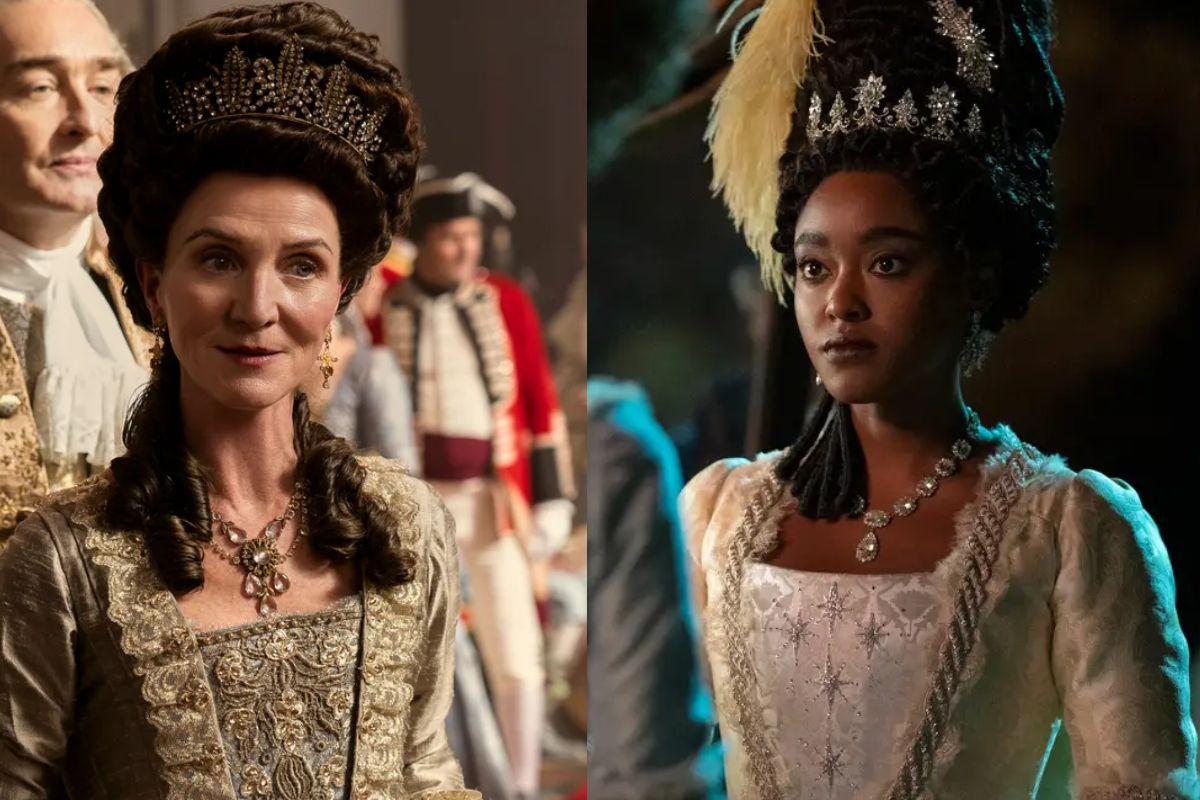‘Queen Charlotte’ Attempts to Retcon One of The Biggest Issues With ‘Bridgerton’
Now the show is rewriting some of its own history.

For all the praise for Bridgerton, there’s been an underlying frustration among many fans of the show, and that’s how it handled race. Instead of creating a fantasy world or adapting the story in a respectful way, the first season explained away a multiracial cast by implying that an interracial marriage between a Queen and King ended racism. (Though not slavery, as that still exists in the colonies alluded to in the show.) With Queen Charlotte: A Brigerton Story releasing as a prequel, there was a fear the show would double down.
However, instead of following through with the established, completely unnecessary reason for a multiracial “ton,” the writers did something unexpected. They retconned it—sort of.
Queen Charlotte readjusted the narrative
**Spoilers for Queen Charlotte: A Bridgerton Story**
Instead of having the Queen leading some radical charge against racism or making all of society colorblind overnight, the change depicted is slowish and calculated. Cringly dubbed “The Great Experiment” (TGE), a younger Lady Danbury (played by Arsema Thomas) and the Queen consort, a.k.a. King George’s mother, Princess Augusta (Michelle Fairley), lead the charge of seeking racial integration of the upper class. Despite working towards this goal simultaneously, the pair are frequently at odds.
Under pressure to marry her son off before news of his ailments spreads, Augusta takes the first steps towards integrating the ton. King George III’s mental health issues threaten the stability of their family’s status and, to an extent, the British Empire. Augusta seems taken aback when seeing Charlotte saying, “very brown,” to which someone in her court explains he did say she has Moor heritage. To correct this error on her part and make the match look wholly intentional, Augusta invites some of England’s wealthy people of color to the wedding. Additionally, Augusta bestows titles (and land) to the Danburys and appoints Agatha Danbury to Charlotte’s network.
Danbury and her peers see this as the perfect opportunity to establish themselves for the good. Throughout the show, Danbury seeks to solidify this shakey standing against the wishes of Augusta. And especially against the wishes of her advisors and connections to Parliament. A wedding was fine—but what about an integrated ball? Tea? This comes to a head in Danbury’s life when she becomes a widow. Without her husband and in a legal gray area, as in inheritance laws have yet to be extended to the non-white elite, she and her family are at risk of losing what grounds have been made.
Depressingly (more) realistic

Augusta for her family and Danbury for the Black bourgeoisie, both ultimately need Charlotte’s involvement. For TGE to work, Charlotte must set precedence and produce an heir to seal the deal. The Queen does not take an active role until the end of the last episode. She is a German princess with no racial solidarity among the Black elites of England. In the Bridgerton-verse, Germany is presented as a racially tolerant society. England’s segregation is strange to Charlotte but not something she feels she needs to worry about because of the “walls.” (Often used as a synonym for privilege in this mini-series.)
This new approach to addressing the implications of a diverse society is still messy but an improvement over what was established in Bridgerton. It gives some of the Black characters a sense of agency. While it was probably employed as a narrative need to create tension, it reflects our issues and persistent beliefs in our own society. Incremental change happened because it suited the needs and interests of the upper class. Augusta’s reasons for pushing for progress were completely related to her own family. The Danburys and other newly titled Black bourgeoisie appear to think their presence alone at the top will trickle down and improve people of color in the Commonwealth. (It doesn’t, and their own class mobility becomes their sole concern.) Characters that resemble the acting government (Parliament) and Lady Ledger are pointed to as the sole people hanging on to racism.
But just because these themes exist, that doesn’t mean Queen Charlotte: A Bridgerton Story is critiquing any of these issues. If anything, the story normalizes all of it with little to no pushback. This semi-retcon of Bridgerton‘s racial politics is a significant improvement but still a failing grade. It’s just not as offensive this time around or as integral to the plot as season one.
(featured image: Netflix)
Have a tip we should know? [email protected]
